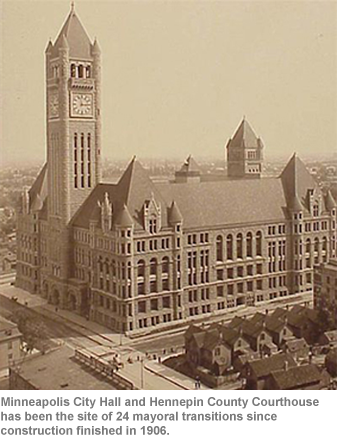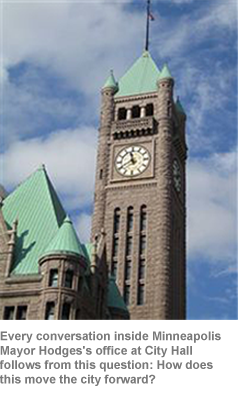FORUM TO ENDURE THROUGH POLITICAL TRANSITIONS
Nearly everyone knows the saying about the two things certain in life: death and taxes. This brief list of inevitabilities could include a third item: political transition.
The changes in government from one mayor's administration to the next can be an uncertain time for those engaged in public policy planning and implementation. As power changes hands and priorities are restructured, what was popular yesterday rapidly becomes irrelevant.
How do we deal with this inevitability? "How" can best be answered by deciding "when." And when is as soon as possible.
 Find Your Champion
Find Your Champion
Upon their election, mayors begin planning their transition almost immediately. For complex public policy efforts such as the National Forum, it is important to get on the transition team's radar screen early. Finding a champion who will communicate the need for continuity and a plan for sustaining this public policy effort is critical. Newly established transition teams sometimes tend to view history as having begun when the teams themselves arrived on the scene. So, make the case as quickly as possible that successful, ongoing efforts such as the Forum must be retained, sustained, and reinvigorated with fresh insight from the new team.
Remember: a new administration develops its own dreams for the city. You have to work hard and work smart to make what you support part of this new vision. Now that the Forum is a long-term, well-established, integral part of the public health approach to reducing youth violence in our member cities, it is easier to engage a new administration on plans to sustain the effort.
Minneapolis Changes Mayors, Maintains Forum Work
Minneapolis, Minn., went through a mayoral transition in January 2014 after 12 years of leadership in the violence reduction arena by Mayor R.T. Rybak. He was succeeded by Mayor Betsy Hodges who, coincidentally, was sworn in the same day as the new Minneapolis youth violence prevention coordinator, Sasha Cotton.
Having been a member of city council before her election, Mayor Hodges was acquainted with the National Forum. She kept it simple, as she analyzed how effective the ongoing work in Minneapolis was to be conducted. "She put three questions on a white board in her office that she has not erased and continues to ask as she determines the effectiveness of how work is performed on behalf of citizens," recalls Cotton, who is also Forum site coordinator for Minneapolis.
The questions, to be considered when any issue is discussed in the mayor's office, are
- How does this move the dial on equity?
- How does this move the dial on growing the city?
- How does this make the city run well?
"With these three questions" Cotton continues, "it is clear why Mayor Hodges sees the value in continuing to support and lead the city's youth violence prevention [YVP] efforts, as YVP plays a critical role in answering part or all three of these questions."
 Minneapolis officials are aware there are disparities in the rate of incarceration and adjudication for youths of color; 88 percent of juveniles cited or arrested over the past 5 years were minorities. Also, 76 percent of young victims of crime were youths of color. These figures underscore the mayor's desire for equity. By focusing on equity, Minneapolis is able to address disparities in education, employment, and other measures of parity that increase a youth's risk of becoming a perpetrator or a victim of violence. In Mayor Hodge's discussion about equity, the Forum has a seat at the table.
Minneapolis officials are aware there are disparities in the rate of incarceration and adjudication for youths of color; 88 percent of juveniles cited or arrested over the past 5 years were minorities. Also, 76 percent of young victims of crime were youths of color. These figures underscore the mayor's desire for equity. By focusing on equity, Minneapolis is able to address disparities in education, employment, and other measures of parity that increase a youth's risk of becoming a perpetrator or a victim of violence. In Mayor Hodge's discussion about equity, the Forum has a seat at the table.
Mayor Hodges has also decided to concentrate on the 18- to 24-year-old age group in her efforts to grow the city and make it safe. Including youth is an important aspect of a city that runs well.
According to Cotton, "Running the city well includes public safety, youth engagement in policy, and a focus on preventing violence before it starts."
YVP efforts in Minneapolis are closely tied to Forum activities and to the mayor's goal of continually answering the three questions by which she governs. In addition to the National Forum, the Mayor is aligning other efforts—with My Brother's Keeper, Cities United, a National League of Cities Juvenile Justice Reform Technical Assistance Initiative, and a Byrne Grant that focuses on domestic violence—as part of her governing vision.
Boston Transition a Boon for Forum Values
In January 2014 the Boston, Mass., city government saw a changing of the guard at its highest level, when Marty Walsh succeeded Boston's longest-serving mayor, Thomas Menino.
"Mayor Walsh is similar to former-Mayor Menino in his commitment to violence prevention and public safety, and his comprehensive approach," observes Jennifer Maconochie, director of strategic initiatives and policies in Office of the Boston, Mass., Police Commissioner. "Therefore, there was not a radical shift to new priorities or strategies, but a more gradual and smooth transition to identify new opportunities for innovation and investment while maintaining proven programming and the long-term strategies and partnerships that had developed over the past 20 years."
On his third day in office, Mayor Walsh appointed William Evans as the permanent commissioner of the Boston Police Department.
One of the first things Commissioner Evans did after being sworn in was expand the number of officers in the School Police Unit and direct them to expand their efforts into elementary schools, in addition to middle and high schools. This was done to foster youth–police relationships at much younger ages. Mayor Walsh, over the course of his first 6 months in office, demonstrated that violence prevention and reduction was among of his top priorities.
Plan Now for Transition
Member cities in the National Forum are engaged in an extraordinary effort to reduce and prevent youth violence. Mayoral transition and the changes that come with it will occur in your city, sooner or later. Preparing for this transition should begin now. Put a plan in place to establish the Forum as a valuable resource in public safety as well as youth and community development. And make sure people know about the valuable work the Forum is doing.
by Michael Hopps
|
|
|
